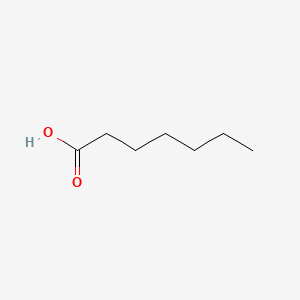| MeSH term | MeSH ID | Detail |
|---|---|---|
| Olfaction Disorders | D000857 | 17 associated lipids |
| Byssinosis | D002095 | 11 associated lipids |
| Mitochondrial Diseases | D028361 | 25 associated lipids |
HEPTANOIC ACID
HEPTANOIC ACID is a lipid of Fatty Acyls (FA) class. Heptanoic acid is associated with abnormalities such as Dehydration. The involved functions are known as Process, Anabolism, inhibitors, Oxidation and fatty acid oxidation. The related lipids are Heptanoates and undecanoic acid.
Cross Reference
Introduction
To understand associated biological information of HEPTANOIC ACID, we collected biological information of abnormalities, associated pathways, cellular/molecular locations, biological functions, related genes/proteins, lipids and common seen animal/experimental models with organized paragraphs from literatures.
What diseases are associated with HEPTANOIC ACID?
HEPTANOIC ACID is suspected in Dehydration and other diseases in descending order of the highest number of associated sentences.
Related references are mostly published in these journals:
| Disease | Cross reference | Weighted score | Related literature |
|---|
Possible diseases from mapped MeSH terms on references
We collected disease MeSH terms mapped to the references associated with HEPTANOIC ACID
PubChem Associated disorders and diseases
What pathways are associated with HEPTANOIC ACID
There are no associated biomedical information in the current reference collection.
PubChem Biomolecular Interactions and Pathways
Link to PubChem Biomolecular Interactions and PathwaysWhat cellular locations are associated with HEPTANOIC ACID?
There are no associated biomedical information in the current reference collection.
What functions are associated with HEPTANOIC ACID?
Related references are published most in these journals:
| Function | Cross reference | Weighted score | Related literatures |
|---|
What lipids are associated with HEPTANOIC ACID?
Related references are published most in these journals:
| Lipid concept | Cross reference | Weighted score | Related literatures |
|---|
What genes are associated with HEPTANOIC ACID?
There are no associated biomedical information in the current reference collection.
What common seen animal models are associated with HEPTANOIC ACID?
There are no associated biomedical information in the current reference collection.
NCBI Entrez Crosslinks
All references with HEPTANOIC ACID
Download all related citations| Authors | Title | Published | Journal | PubMed Link |
|---|---|---|---|---|
| Tempel GE et al. | Improvement in organ blood flow by inhibition of thromboxane synthetase during experimental endotoxic shock in the rat. | 1986 May-Jun | J. Cardiovasc. Pharmacol. | pmid:2425166 |
| Royet JP et al. | Specificity of spatial patterns of glomerular activation in the mouse olfactory bulb: computer-assisted image analysis of 2-deoxyglucose autoradiograms. | 1987 | Brain Res. | pmid:3620970 |
| Gagliardo A and Teyssèdre A | Interhemispheric transfer of olfactory information in homing pigeon. | 1988 | Behav. Brain Res. | pmid:3358853 |
| Grislain L et al. | Metabolism of amineptine in rat, dog and man. | 1990 Oct-Dec | Eur J Drug Metab Pharmacokinet | pmid:2088771 |
| Mizutani T et al. | [Intracellular calcium kinetics after odorant stimulus in olfactory receptor cells isolated from mice]. | 2000 | Nippon Jibiinkoka Gakkai Kaiho | pmid:11197816 |
| Srivastava P et al. | Enhancement of mass transfer using colloidal liquid aphrons: measurement of mass transfer coefficients in liquid-liquid extraction. | 2000 | Biotechnol. Bioeng. | pmid:11042549 |
| Norberg J et al. | Microporous membrane liquid-liquid extraction coupled on-line with normal-phase liquid chromatography for the determination of cationic surfactants in river and waste water. | 2000 | J Chromatogr A | pmid:10720266 |
| Dehnhard M et al. | Noninvasive monitoring of adrenocortical activity in roe deer (Capreolus capreolus) by measurement of fecal cortisol metabolites. | 2001 | Gen. Comp. Endocrinol. | pmid:11551112 |
| O'Connor DB et al. | Activational effects of testosterone on cognitive function in men. | 2001 | Neuropsychologia | pmid:11585606 |
| Ferrando AA et al. | Testosterone administration in severe burns ameliorates muscle catabolism. | 2001 | Crit. Care Med. | pmid:11588456 |
